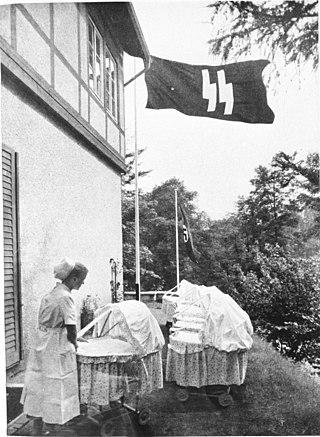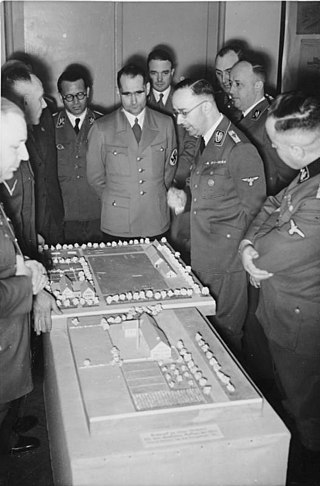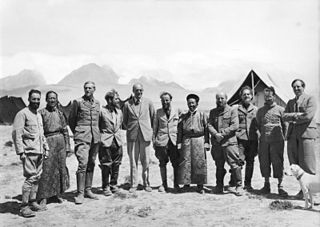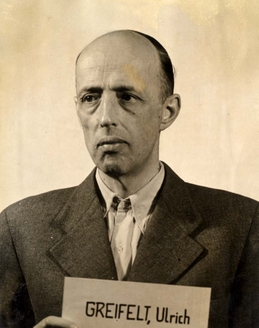Related Research Articles

Lebensborn e.V. was a secret, SS-initiated, state-registered association in Nazi Germany with the stated goal of increasing the number of children born who met the Nazi standards of "racially pure" and "healthy" Aryans, based on Nazi eugenics. Lebensborn was established by Heinrich Himmler, and provided welfare to its mostly unmarried mothers, encouraged anonymous births by unmarried women at their maternity homes, and mediated adoption of children by likewise "racially pure" and "healthy" parents, particularly SS members and their families. The Cross of Honour of the German Mother was given to the women who bore the most Aryan children. Abortion was legalized by the Nazis for disabled and non-Germanic children, but strictly punished otherwise.

Theodor Eicke was a senior SS functionary and Waffen SS divisional commander during the Nazi era. He was one of the key figures in the development of Nazi concentration camps. Eicke served as the second commandant of the Dachau concentration camp from June 1933 to July 1934, and together with his adjutant Michael Lippert, was one of the executioners of SA Chief Ernst Röhm during the Night of the Long Knives purge of 1934. He continued to expand and develop the concentration camp system as the first Concentration Camps Inspector.

Oswald Ludwig Pohl was a German SS functionary during the Nazi era. As the head of the SS Main Economic and Administrative Office and the head administrator of the Nazi concentration camps, he was a key figure in the Final Solution, the genocide of the European Jews. After the war, Pohl went into hiding; he was apprehended in 1946. Pohl stood trial in 1947, was convicted of crimes against humanity, and sentenced to death. After repeatedly appealing his case, he was executed by hanging in 1951.

The Ahnenerbe was a Schutzstaffel (SS) pseudoscientific organization which was active in Nazi Germany between 1935 and 1945. It was established by Reichsführer-SS Heinrich Himmler in July 1935 as an SS appendage devoted to the task of promoting the racial doctrines espoused by Adolf Hitler and the Nazi Party. The Ahnenerbe was composed of scholars and scientists from a broad range of academic disciplines and fostered the idea that the Germans descended from an Aryan race which was racially superior to other racial groups.

Odilo Lothar Ludwig Globocnik was a Nazi Party official from Austria and a perpetrator of the Holocaust. A high-ranking leader of the SS, Globocnik played a leading role in Operation Reinhard, the organized murder of around one and a half million Jews, mostly of Polish origin, during the Holocaust in the Majdanek, Treblinka, Sobibór and Bełżec extermination camps. Historian Michael Allen described him as "the vilest individual in the vilest organization ever known". Globocnik killed himself shortly after his capture and detention by British soldiers.
Martin Broszat was a German historian specializing in modern German social history. As director of the Institut für Zeitgeschichte in Munich from 1972 until his death, he became known as one of the world's most eminent scholars of Nazi Germany.

Karl Fiehler was a German Nazi Party (NSDAP) official and Mayor of Munich from 1933 until 1945. He was an early member of the Nazi Party having joined in 1920. In 1933, he became a Reichsleiter in the party and was a member of the Reichstag. In March 1933, he was appointed Mayor of Munich and held that post until the end of World War II in Europe. During his time as mayor, Fiehler was zealously anti-Semitic and saw to it that the Jewish population of the city was persecuted. After the war in January 1949, Fiehler was sentenced to two years in a labour camp, but the sentence was suspended given the previous three-and-a-half years of detention he had already served.

Herman Wirth was a Dutch-German historian, a Nazi and scholar of ancient religions and symbols. He co-founded the SS-organization Ahnenerbe but was later pushed out by Heinrich Himmler.

Karl Jäger was a German mid-ranking official in the SS of Nazi Germany and Einsatzkommando leader who perpetrated acts of genocide during the Holocaust.

Kurt Paul Schmitt was a German jurist versed in economic matters. A supporter of the Nazis since 1930, he joined the Nazi party in 1933, becoming also an honorary SS. He presided over Allianz insurance company, and was the Reich Economy Minister from 1933 to 1934. His antisemitic views let him believe that the role Jews played in politics, law and the arts was excessive, and had to be drastically curtailed if not totally eliminated.

In Nazi Germany the Volksdeutsche Mittelstelle or VoMi was a Nazi Party agency founded to manage the interests of the Volksdeutsche - the population of ethnic Germans living outside the Third Reich. Ultimately coming under Allgemeine-SS administration, it became responsible for orchestrating the implementation of Nazi Lebensraum policies in Eastern Europe during World War II.

The 1938–1939 German expedition to Tibet, a German scientific expedition, took place in Tibet between April 1938 and August 1939 under the leadership of the German zoologist and SS-officer Ernst Schäfer.

The Reichsuniversität Straßburg was founded in 1941 by the Nazis in Alsace after the annexation of Alsace-Lorraine by Nazi Germany. The University of Strasbourg had moved to Clermont-Ferrand in 1939. The university's purpose was to restore the German character of the Kaiser-Wilhelm-Universität, as the University of Strasbourg was named from 1872 to 1918, and to advance "German knowledge" in the annexed territory. When the Allies arrived in Alsace in 1944, the Reichsuniversität was first transferred to Tübingen and then dissolved.
Historians, political scientists and philosophers have studied Nazism with a specific focus on its religious and pseudo-religious aspects. It has been debated whether Nazism would constitute a political religion, and there has also been research on the millenarian, messianic, and occult or esoteric aspects of Nazism.

Deutsche Wirtschaftsbetriebe, abbreviated DWB, was a project launched by Nazi Germany in World War II. Organised and managed by the Allgemeine SS, its aim was to profit from the use of slave labour extracted from the Nazi concentration camp inmates.

Ulrich Heinrich Emil Richard Greifelt was a German SS functionary and war criminal during the Nazi era. He was convicted at the RuSHA trial at Nuremberg, sentenced to life imprisonment, and died in prison.

Wolfgang Krause was a German philologist and linguist. A professor at the University of Göttingen for many years, Krause specialized in comparative linguistics, and was an authority on Celtic studies, Tocharian languages, Germanic studies, Old Norse and particularly runology.

The ideology of the Schutzstaffel, a paramilitary force and an instrument of terror of the Nazi Party in Nazi Germany, emphasized a racist vision of "racial purity", primarily based on antisemitism and loyalty to Adolf Hitler and Nazi Germany.

Inge Viermetz was responsible for the Lebensborn in Nazi Germany. As an assistant to Max Sollmann, head of the Lebensborn, she was acquitted at the RuSHA Trial.
Richard Kaselowsky was a German entrepreneur, industrialist, manager of Dr. Oetker, and member of the Nazi Party and Freundeskreis der Wirtschaft. He was the eldest son of the manufacturer Richard Kaselowsky, a deputy in the Prussian state parliament. He was the stepfather of Rudolf August Oetker.
References
- ↑ Hermann Kaienburg, Die Wirtschaft der SS, Berlin: Metropol, 2003, ISBN 9783936411041, p. 199, (in German)
- 1 2 3 4 5 6 7 8 Enno Georg, Die wirtschaftlichen Unternehmungen der SS, Schriftenreihe der Vierteljahrshefte für Zeitgeschichte 7, Stuttgart: Deutsche Verlags-Anstalt, 1963, OCLC 1990667, p. 19 (in German)
- 1 2 3 Heather Pringle, The Master Plan: Himmler's Scholars and the Holocaust, New York: Hyperion, 2006, ISBN 9780786868865, n.p.
- 1 2 3 Michael Thad Allen, The Business of Genocide: The SS, Slave Labor, And The Concentration Camps, Chapel Hill: University of North Carolina, 2002, ISBN 9780807826775, pp. 34–35.
- 1 2 "SS-Konzern: Pfeffer aus Dachau", Der Spiegel , 25 December 1963, pp. 30–32 (in German) (pdf)
- ↑ Kaienburg, p. 494.
- ↑ Walter Naasner, ed., SS-Wirtschaft und SS-Verwaltung: das SS-Wirtschafts-Verwaltungshauptamt und die unter seiner Dienstaufsicht stehenden wirtschaftlichen Unternehmungen: und weitere Dokumente, Schriften des Bundesarchivs 45a, Düsseldorf: Droste, 1998, ISBN 9783770016037, p. 271 (in German)
- ↑ Michael Kater, Das "Ahnenerbe" der SS 1935–1945: Ein Beitrag zur Kulturpolitik des Dritten Reiches, Studien zur Zeitgeschichte, Stuttgart: Deutsche Verlags-Anstalt, 1974, ISBN 9783421016232, p. 59.
- ↑ Volker Koop, "Dem Führer ein Kind schenken": die SS-Organisation Lebensborn e.V., Cologne: Böhlau, 2007, ISBN 9783412216061, p. 72 (in German)
- ↑ Trials of war criminals before the Nuernberg Military Tribunals under Control Council law no. 10, Nuremberg, October 1946–April, 1949 Volume V Case 8: U.S. v. Greifelt (cont.) Case 4: U.S. v. Pohl (Pohl case), Washington, D.C.: U.S. G.P.O., 1950, OCLC 12799641, p. 532.
- ↑ Michael Thad Allen, "The Business of Genocide: the SS, Slavery, and the Concentration Camps", in: Business and Industry in Nazi Germany, ed. Francis R. Nicosia and Jonathan Huener, University of Vermont, Center for Holocaust Studies, New York: Berghahn, 2004, ISBN 9781571816542, pp. 81–103, p. 85.
- ↑ Allen, "The Business of Genocide" in Business and Industry in Nazi Germany, p. 87.
- ↑ Franz Wegener, Der Alchemist Franz Tausend: Alchemie und Nationalsozialismus, Politische Religion des Nationalsozialismus 6, [Gladbeck]: KFVR, 2006, ISBN 9783931300180, p. 142 (in German)